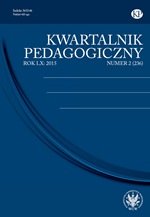Pytanie o sens (w) edukacji. Grondinowska semantyka sensu i jej pedagogiczne egzemplifikacje a antyredukcjonizm hermeneutyki kształcenia
The question about the sense of (and in) education. Grondin’s semantics of sense, its examples within pedagogy and the antireductionism of ...
Author(s): Małgorzata PrzanowskaSubject(s): Social Sciences
Published by: Wydawnictwa Uniwersytetu Warszawskiego
Keywords: Jean Grondin: sens;; taste; education; imitation; repetition; reductionism
Summary/Abstract: The article begins with a short presentation of an interesting semantics concerning the notion of sense from Jean Grondin’s book Du sens de la vie. Essai philosophique. The author singles out four aspects of sense: directional, semantic (the issue of lingual meaning and values), sensous/ sensory (connected with taste, sensus communis) and reflective (connected with the wisdom to judge rightly). Grondin suggests considering the issue of the sense of life not as something added, imposed to life (the constructivist perspective) but rather as something to be discovered, or read from within our experience. In the context the most important question about the sense of education has been posed. The main conclusions of the text are as follows. Contemporary education seems to be reduced to different forms: techno-instrumental, moralizing or ideological, aesthetic “French-polished” and bureaucratically statistical. However, hermeneutics can still provide a crucial inspiration for modern education. The hermeneutic rehabilitation of taste in its sense of (re)cognition, savoring (relishing) and understanding of things needs to be (re)discovered within education. It seems that the modern tendency to reduce human reality and human experience to a narrow area of specialisation, might be overcome by a hermeneutic invitation to see things in a wider, non-generalised, horizon. Reducing the sense of education to one of the aspects mentioned by Grondin means to make education something perhaps useful, effective, attractive because of the ‘ends and means’ technology, but at the same time senseless and lacking life, spirit, inspiration and taste. The sense of education is to be uncovered/ discovered and not merely imposed and then assimilated. However, education needs – paradoxically – a kind of repetition and imitation comparable to the experience full of listening to the sounds and words in the process of uttering something. It is not the same as the reproduction or duplication of content. That is why in education the interpreter’s fine inner ear is needed. It is needed not in order to replace the content with something elusive, but rather to regain – thanks to this sensual elusiveness – a sense of the content and its voice. The importance of the voice is that in listening out for it an encounter with something different from our own particularity is possible.
Journal: Kwartalnik Pedagogiczny
- Issue Year: 236/2015
- Issue No: 2
- Page Range: 30-55
- Page Count: 26
- Content File-PDF

